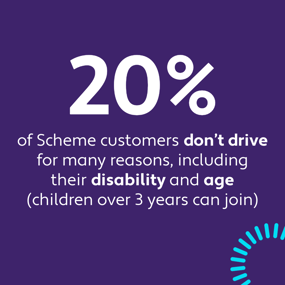Recent comments in the press, reported as being from a source in Government, have presented misleading information about the disabled people who choose to use the Motability Scheme.
Around 80,000 or 10 percent of Scheme vehicles have adaptations, but this doesn’t mean that the other 90% don’t need access to affordable and accessible transport.
40 percent of Scheme customers use a wheelchair all or some of the time but many either don't need an adaptation to drive, or travel as a passenger as they cannot drive themself.
Around 20 percent of Scheme customers can’t or don’t drive for many reasons including their disability and age (children over three years old can join the Scheme). Their parents or carers may not require adaptations, but the car is a lifeline to them and the disabled person they drive for.
In addition to this, 43% of disabled people on the Scheme are a primary driver on the insurance policy but need help from another driver. This could be for many reasons including help getting in and out of the car, fluctuating conditions, pain and medical treatment.
Features many see as luxuries, such as push-button car boots, are game changers for disabled people. The Motability Scheme makes these essentials accessible, turning what was once a costly upgrade into a standard benefit for those who need it most.
These figures highlight the diversity of need among Scheme customers and make clear that the Scheme is not simply about whether a vehicle is adapted or not, but about providing independence for people who either cannot drive themselves, or who can drive a standard car. To suggest otherwise is both inaccurate and potentially harmful.
These figures show the scale of unmet need for accessible transport and the continued importance of ensuring disabled people can make the journeys they choose with dignity and independence.






